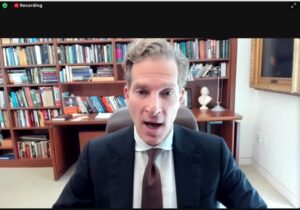 Ed. note: This is the latest installment of The ATL Interrogatories, brought to you by Lateral Link. This recurring feature will give notable law firm partners an opportunity to share insights and experiences about the legal profession and careers in law, as well as about their firms and themselves.
Ed. note: This is the latest installment of The ATL Interrogatories, brought to you by Lateral Link. This recurring feature will give notable law firm partners an opportunity to share insights and experiences about the legal profession and careers in law, as well as about their firms and themselves.
Andrew L. Sandler, Chairman and Executive Partner of BuckleySandler LLP and Chief Executive Officer of Treliant Risk Advisors LLP, is a recognized leader in financial services litigation, enforcement, regulation, and compliance. A wide range of financial services companies look to Mr. Sandler for strategic advice and to help them navigate complex litigation and civil and criminal investigations and examinations by federal and state enforcement and bank regulatory agencies. You can read his full bio here.
1. What is the greatest challenge to the legal industry over the next 5 years?
The challenges will be different for different segments of the legal industry. The top end of the legal industry needs to transform its business model to one that delivers better client service and better economic value to clients. This will require a fundamental reshaping of the historic law firm model: the way law firms pay their lawyers; utilize office space; and train young lawyers. I believe this fundamental restructuring is creating enormous opportunities for new, smaller boutique law firms like BuckleySandler, that operate only in areas of core competency and where very junior lawyers develop expertise very early in their careers through extensive training and by the opportunity to stay busy with high value work.
2. What has been the biggest positive change to the legal profession since the start of your career?
First, technology has transformed the practice of law. Lawyers no longer need to be in the office all the time to be productive. Research can be done more effectively, documents prepared more efficiently and communications more completely and timely. Of course, the challenge is to use technology as a beneficial tool. While 24/7 availability and access is a great advantage when needed, it can make a balanced life impossible if not properly controlled. Second, the talent pool has more than doubled as women have taken their rightful place as co-equal participants in the legal profession. Third, a much more competitive industry has resulted in the true embrace of meritocracy. While there are still strides to be made on the diversity front, really smart, hardworking individuals who are team oriented and have great judgment will be successful in the law today without regard to race, ethnicity, gender or sexual orientation. Finally, the development of a truly competitive marketplace where clients can more easily find the expertise that they need has transformed the legal industry. Law firms can no longer thrive based on their historic reputation. They must produce great results every day and do so with great client service and in an economically efficient way.
3. What has been the biggest negative change to the legal profession since the start of your career?
The evolution of law from a profession to a business has some real downsides. As the father of two law students (with a third probable), I worry greatly about the future for young lawyers. The law really can be a noble profession where one can be well compensated to do very interesting work with social and economic value. However, increasingly in the quest for growth and profits and to not fall behind in Am Law statistics, some firms neglect their responsibilities to their communities, clients and colleagues, particularly young lawyers and staff. Also, the focus on excessively high billable hours is a disservice to clients, lawyers and their families. In my almost 30 years of practicing law, I have noted very little correlation between the lawyers that bill the most hours and the lawyers that are most successful and satisfied in their careers.
4. What is the greatest satisfaction of practicing law?
For me it is the diversity of what I get to do every day. I have the privilege and opportunity to work with good friends and long-term colleagues to build a new law firm model in a challenging environment. I work with some of the finest and most able individuals I have ever known. Together, we are building a collaborative environment where lawyer and non-lawyer members of our team have the opportunity to reach their full potential. Just as important to me is the part of my day spent on the craft of lawyering. I could never be a full-time manager. Much of my professional satisfaction for almost 30 years has come from helping clients solve difficult problems. The podium in a courtroom is still my favorite place to spend a day and the collaborative effort to find an innovative way to solve a client’s legal and/or regulatory problems remains a passion.
5. What is the greatest frustration of practicing law?
My greatest frustration is lack of time. This manifests itself in my not being able to be personally involved in as many of the interesting and important client matters that come our way and not having the bandwidth to be as good a mentor and thoughtful law firm leader as I would like. Lack of time is also defeating my efforts to lower my golf handicap.
6. What is your firm’s greatest strength?
Our greatest strength is our people and their commitment to our clients and each other. We have an enormously talented group of lawyers and staff that deliver great value every day. Our expertise is our secret sauce. Every one of our lawyers has meaningful expertise in some aspect of the legal challenges facing the financial services industry. Our partners are uniformly viewed as among the top financial services lawyers in the country. And, we have passion for what we do. We care deeply about our clients, our communities and our profession.
7. What is the single most important personal characteristic for a successful lawyer in your field?
Integrity and character are prerequisites to success. Intelligence, tenacity, determination, creativity, commitment to the team, loyalty and outstanding judgment create success.
8. What is your favorite legally themed film or television show?
For TV, that would have to be the original Law and Order (affiliate link), and as for a movie, A Few Good Men (affiliate link).
9. What is your favorite legally themed book (fiction or nonfiction)?
I like to read biographies about and memoirs of great lawyers, especially when they share my Brooklyn roots. Among my favorites are the following:
In the Ring: The Trials of a Washington Lawyer (affiliate link) by Bob Bennett — Bob has been an important mentor for more than 20 years. I had the privilege of working with him as my partner at Skadden. He has had one of the most fascinating careers of any Washington lawyer functioning at the intersection of litigation and politics. When one talks about great lawyer judgment and instinct, Bob Bennett should be on the top of anyone’s list. His discussion of many of his most important cases is a great read.
The Outliers (affiliate link) by Malcolm Gladwell — Gladwell’s chapter on the great New York lawyers of the 20th Century who grew up in Brooklyn as the children of garment workers fascinated me. Among the subjects is my former Skadden partner, Joe Flom, one of the great lawyers and law firm leaders of all time. While I was born in Brooklyn a generation later, the family stories really resonate with me from my own early experiences.
I also really enjoy legal fiction, particularly about great defense efforts to thwart government abuse of legal process. The classic is Harper Lee’s To Kill a Mockingbird (affiliate link). I also enjoy all Scott Turow and early John Grisham novels. Favorites are Turow’s Presumed Innocent (affiliate link) and Grisham’s A Time to Kill (affiliate link).
10. What would you have been if you weren’t a lawyer?
I am a lawyer because I could not hit a 90 mph fast ball. If I were to stop being a practicing litigator and legal counselor, I would be a full time entrepreneur. I have learned a lot in the process of creating a new law firm and a new consulting firm, Treliant Risk Advisors. I have some ideas for other new ventures that I would be interested in pursuing. I think I would also enjoy serving on more non-profit boards. It is extremely rewarding to help manage and finance entities delivering needed services to the community.
 Law Schools
Law Schools Law Schools
Law Schools Morning Docket
Morning Docket Law Schools
Law Schools Law Schools
Law Schools Law Schools
Law Schools Law Schools
Law Schools Law Schools
Law Schools Courts
Courts Law Schools
Law Schools


 Courts
Courts Government
Government Law Schools
Law Schools Law Schools
Law Schools Law Schools
Law Schools Law Schools
Law Schools Law Schools
Law Schools Ed. note: This is the latest installment of
Ed. note: This is the latest installment of 


